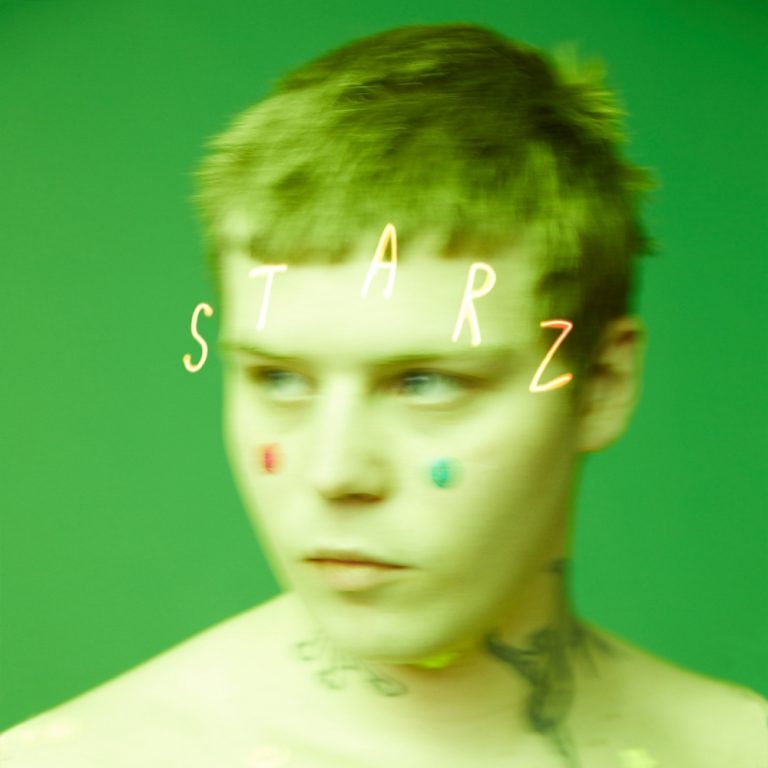Slowly but surely, the polarizing Jonatan Aron Leandoer Håstad, popularly known as Yung Lean, has been shedding his image as a dorky “meme rapper” through tragedy and each passing record release, continuing to now, with his highly-anticipated seventh full-length project Starz. Following an enticingly elaborate record rollout, which saw Lean perform on the back of a 16-wheeler and entertain whispers of an Ariel Pink feature, the still incredibly young Yung Lean – 23 – has finally arrived in brightest form, blasting through the atmosphere of exhausted presuppositions and labels.
Now past his days as a viral internet blip, Starz is a flex of Lean’s intoxicating cloud rap muscle that also pronounces the talents of frequent collaborator and Drain Gang member, whitearmor, who provides production along the way. Throughout the record, both individuals in this rapper-producer duo glow without outshining the other, making it clear from the get-go that these two operate from the same visionary plane. As Starz brandishes Lean’s hazy flows and whitearmor’s icy synth blows in a beautiful marriage, new Lean listeners and Sad Boys alike are treated to a world of simultaneous confusion and beauty.
Filled with drug-addled bangers and overcast slow-burns, each track on Starz is cut from a single cloth that veils the ever-evolving future of cloud rap, beginning with the explosive “My Agenda”. Shrouded in fuzz and distortion, the album opener is Lean at his most abrasive, as he thrusts listeners into unfamiliar waters of horrorcore-leaning raps and industrial noise. Those who are not completely thrown off by the track’s heaviness are primed for the remainder of the album with Lean’s shouted mantra: “All-star, no face, ski mask my agenda / All-star, no face, ski mask my agenda.” By no means is “My Agenda” a sonic indicator of the entirety of the rest of the album, but it is a shadowy precursor to more haunting cuts like “Dance In The Dark” and “Sunset Sunrise”.
Unlike the propulsive “My Agenda” and trap-heavy “Iceheart”, “Dance In the Dark” slows things down to a brooding lull. As whitearmor’s chilling synths whisperingly converse back-and-forth with Leans’s hushed bars, listeners witness the rapper entertain a darker, more destructive path, coaxed on by the spell of Angel Dust (PCP). Similarly, the penultimate track “Sunset Sunrise” finds Lean in a trance and on knife’s edge as he drops acid, weighing whether or not he should end it all: “Every time it touches my tongue, I can’t decide / Whether I should stop or keep going tonight.”
Though the aforementioned tracks are some of the murkiest moments of Lean’s career, musically, the rest of the record sees him run the spectrum of melancholy, dreaminess, and even sprightliness. But through even the brightest of sounds, Lean just as effectively manages to express his dejection, depression, and intoxicated confusion. For instance, the sparkling “Outta My Head”, though kissed with a dewy mist, features a delirious Lean “off an oxy,” seeking clarity in the world around him and a romantic relationship that went awry. While his voice is noticeably pitched an octave higher, the rapper seems considerably more bitter and hopeless than normal: “Fuck ’em, I don’t care / Don’t wanna be near you or breathe your air / I’ll see you there.”
Then there is “Yayo”, which is at once dream-filled and the most trap-heavy undertaking on the album. An infectiously catchy production that contrasts with Lean’s recounting of his 2015 cocaine overdose in Miami, “Yayo” – with all its emotional baggage – still causes you to flare your arms to the side like an airplane with eyes closed while wasted. The most memorable moment of Starz arrives via the opulent display of the title track. Exceeding the hype that arises when a name as noteworthy as Ariel Pink is listed, “Starz” is a jaw-dropping collision of synth-adjacent worlds as swelling arrangements progress the track toward crescendoing, art-pop heights.
Amidst the album’s overwhelming haze, Lean delivers much-needed levity – though deceptive – through the contagious “Dogboy”. Overflowing with mischievous charm, the sticky track wields a syrupy sweet hook from the rapper, while whitearmor reaches into his increasingly diverse cauldron of sounds, topping the track off with frozen, synthetic droplets of fun. Though it seems facetious on the surface, “Dogboy” still finds Lean toying with self-destruction, comparing himself to a dog running rampant through life without regard to consequences. “Dogboy” is proof that the emotional complexities of Lean’s music are more than what meets the ears; it incites a conflicting feeling within through its drastically bright quality that belies how dark his lyrics really are.
Considering his beginnings as an insincere – albeit misjudged – viral sensation, Lean’s artistic fortitude has often been dismantled as existing for aesthetic purposes. What was once considered as simply “nice” and “gorgeous,” the rapper’s sound is now more textured with down-to-earth lyrics and depressing sentiments, even more so than his 2016 album Warlord, which was recorded during his well-documented hospitalization. With most viral music sensations having eventually made their way down the drain into the obscurity of nowhere, Yung Lean has made it. With whitearmor already garnering respect from his work with Drain Gang, it’s time to take Yung Lean seriously as well.

